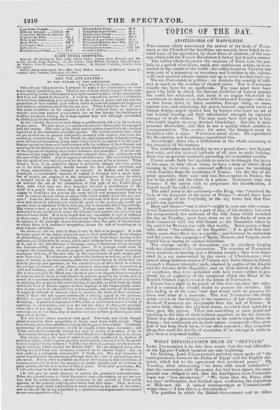TOPICS OF THE DAY.
APOTHEOSIS OF NAPOLEON.
THE cannon which announced the arrival of the body of Napo- LEON at the Church of the Invalides, can scarcely have failed to re-
mind some of the spectators, by sheer force of contrast, of the can- non which told the French Revolution it had at last found a master. The vollies which dispersed the sections of Paris were the pre- lude to a period of as fierce, rapid, and continuous action, as is re- corded in the annals of the world: the vollies heard on Tuesday last were part of a mummery as transitory and heartless as the canvass walls and cracked plaster statues run up to serve for that day's use. We are Protestants in politics : we disclaim the worship of mili- tary as much as the worship of clerical saints. Nor is NAPOLEON exactly the hero for an apotheosis. The man must have been great who held in check the fiercest ebullition of human passioa the world has witnessed, and made it an engine wherewith he overturned or shook every throne of Continental Europe—who was at last borne down by sheer numbers, Europe rising en masse against hinn and suffocating his power beneath repeated waves of
human beings, urged against him by leaders who knew DO art of
war beyond wearing out their adversaries' strength by repeated charges of fresh victims. The man must have had good in him who could inspire no many devoted friendships. But this is mere personal distinction ; and that is not a quality which entitles to commemoratian. The martyr, the saint, the demigod, must be identified with a cause. NAPOLEON stood alone. Ile repudiated the Revolution, and Legitimacy repudiated lain.
.Accordingly, there was a hollowness in the whole ceremony of the reception of his remains.
The multitudes made holyday to see a grand show ; but beyond that wish, and the natural aptitude of all men to make holyday, there was no general sentiment pervading the assembled crowds.
France sends forth her myriads to receive in triumph the bones of the man, to bear whose name, to have a drop of whose blood running in their veins, is esteemed sufficient cause for banishing whole ffimilies from the territories of France. On the day of the great spectacle, there were only two BON APARTES in France, the one in his coffin and the other in a prison. Naronnosr onee was France : if the nation wish to perpetuate the identification, it should recall his exiled family.
The chief actor in the ceremony—the King, who " received the body of the Emperor in the name of France "—would have been chary enough of his hospitality to the dry bones had that Em- peror's son survived.
Here and there—" rani nantes"—might be seen one who remem-
bused NAPOLEON—who was a part of him, of his armies ; but even the co:nparatively few uniforms of the Old Army which revisited
the day on Tuesday, must have done so on the backs of men as
little connected with the Old Guard as the Minneluke taken by the crowd for RUSTAN was with that worthy. Sonic penny -a-liner
talks about " the soldiers of the Republic": it is good five-and- thirty years since there was a republic; and between its extinction and the peace, the campaigns of Spain, Moscow, and Leipzie, made fearful havoc among its veteran battalions.
The strange medley of decorations was in excellent keeping with the character of' the transaction. The remains of NAPOLEON
were received, on landing, into a Grecian temple ; they were depo- sited in it car surmounted by the crown of Chm:leinagne; they passed along between statues of Victory and Notre Dame de Grace, through a Roman triumphal arch, adorned by eagles of the Empire and the tricolor of the Republic ; and on their arrival at the place of sepulture, they were sprinkled with holy water—either in gra- titude for or expiation of the treatment which. the Head of' the Romish Church experienced at the hands of NArso.Eois. France has a right to be proud of him who was once her ruler, and it is natural she should desire to possess his remains. But this flailing is of the same kind that would wish to preserve bus
dress amd arms in it museum. The real NAPOLEON—file living spirit—exists in her history, in the memories of her citizens: the deeds of NAPOLEON are inseparable from the soil of France. It
matters little where the physical atoms, to which that spirit for a time gave life, repose. There was something at once grand and touching in the idea of their isolated sepulture in the ffir Atlantic. There was also a generous sentiment in the wish to regain them for France : but sentiments are in their nature evanescent—they grow
fade if' too long dwelt upon, or too often repeated; they evaporate altogether amid the details of execution, if an attempt is made to give them a corporeal reality.


























 Previous page
Previous page